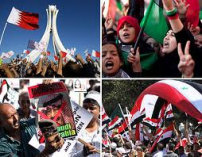Largely overshadowed by the war in Ukraine, Syria remains a deeply divided and violent country, where military conflict has recently reignited.
Perspectives on the Arab Spring

Over the past several years, I have been reflecting on the Arab Spring from the perspective of the international community’s response, its implications for international security, and the violent nature of most of the transition processes. These posts have become more broadly focused on the Middle East and (North) Africa and more irregular as time has passed…
Libya: Amid Hope for Peace, Regional Rifts Still Pose Hurdles
2021 is meant to be Libya’s transitional year. The new interim government faces huge tasks.
Building peace through subnational governance: The case of Libya
Subnational governance is at the heart of the ongoing conflict in Libya.
Libya: Amid Hope for Peace, Regional Rifts Still Pose Hurdles
2021 is meant to be Libya’s transitional year. The new interim government faces huge tasks.
Building peace through subnational governance: The case of Libya
Subnational governance is at the heart of the ongoing conflict in Libya.
Yemen: Engaging, Not Isolating
To resolve the conflict, the Biden administration will have to grasp the nettle of subnational governance reform and be prepared to work with the Houthis.
Libya: Subnational Governance as an Anchor of Stability
As the Libyan people see renewed prospects for peace, subnational governance may represent an integral part of a resolution to protracted instability.
Libya: Subnational Governance as an Anchor of Stability
As the Libyan people see renewed prospects for peace, subnational governance may represent an integral part of a resolution to protracted instability.
Extremism must be a problem shared
We are witnessing more terrorist attacks that occur across more countries and kill more people (and, importantly, more Muslims than non-Muslims). It is pointless for world leaders to issue shared statements of condemnation while continuing to pursue otherwise nationally-centred responses to the problem.
Al-Qaeda: thinking local in regional turmoil spells trouble for the West
Al-Qaeda may not have regained the global threat potential that it posed a decade or so ago – at least, not yet. But its local and regional efforts have made it, in many cases, a powerful and entrenched source of instability. If left unchecked, such local and regional power can grow into something altogether more terrible.
Iran’s nuclear weapons deal will rebalance the Middle East
Signed by the P5 + Germany and mediated by the EU’s foreign policy chief, Baroness Catherine Ashton, the deal achieved with Iran on the latter’s nuclear programme has important implications for regional and international security dynamics that go well beyond nuclear weapons.
Recovery from the Arab Spring will take a generation or more
Predictions that may take a generation or more for the Middle East to recover from the turmoil that the Arab Spring are clearly a sobering assessment. But they are hardly surprising given that there has been no significant improvement in people’s living conditions, that political tensions and repression persist and that levels of violence are on the up.
Prepare for more drones, and less all-out war
As drone technology advances and proliferates ever further, national and international security interests will increasingly come to be seen being served better by drones than by expeditionary campaigns. That said, the temptation for more state (and non-state) actors to use drones and to do so more often, will not necessarily make the world a safer or less violent place.
